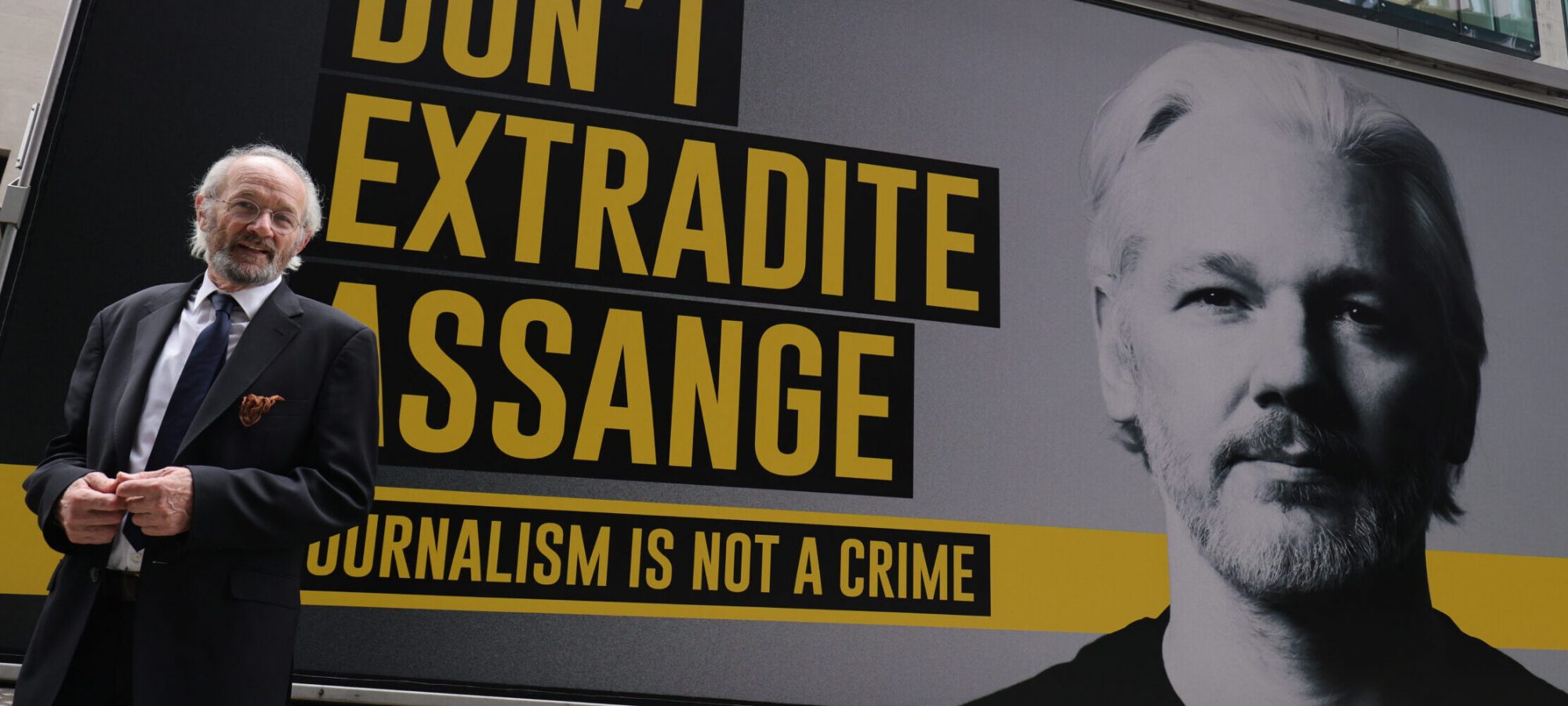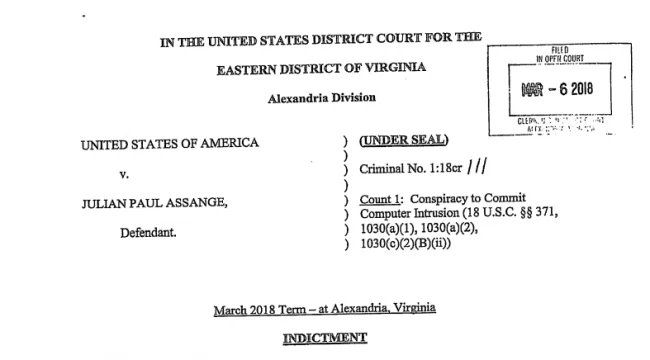Suzie Halewood

The United States District Court for the Eastern District of Virginia indictment of Julian Assange is a curious document. By the end of it you can’t help feeling that if anyone is to be indicted, it should be the US Government and the CIA.
Assange is accused of conspiracy to receive national information, obtaining national defence information, disclosure of national defence information and conspiracy to commit computer intrusion. Which is just a regular day at the office for any one of the alphabet agencies such as the CIA, FBI and NSA or for that matter, Apple, Microsoft, Facebook, Nielsen and the rest.
According to the Oxford English dictionary, ‘conspiracy’ is a secret plan by a group of people to do something harmful or illegal. But there was nothing secret about it. Assange used his own name, advertised for material of ‘ethical significance’ on the Wikileaks website and publicly announced the search for such information at the 26th Chaos Communication Congress in December 2009.
The CIA website on the other hand talks of ‘covert action’ and ‘coordinated espionage’ while MI5 ‘eavesdrop, tap telephone calls and communicate secretly’ in order to spy both nationally and internationally.
Was it harmful? According to the indictment, any unauthorized disclosure ‘could harm the national security of the United States’. But before documents were released, Wikileaks redacted information such as names of confidential informants so as not to put lives at risk. It was only when threatened by the intelligence community that Assange warned that such ‘harm minimization’ could not be guaranteed if anything should happen to himself or Wikileaks as encrypted backups of material yet to be released were routinely distributed and required only a password for the material to be made instantly available.
Furthermore the US Army admitted in a 2013 court hearing, that a team of 120 counter-intelligence officers had failed to find a single person in Iraq and Afghanistan who had died because of disclosures by WikiLeaks.
As for the legality, Assange didn’t sign a classified information nondisclosure agreement. What he did was take a leaf directly out of the CIA playbook: ‘Our operations officers recruit well-placed human assets with access to information’. The CIA website goes on to point out that spying can be a dangerous game: ‘Spies risk imprisonment, the loss of their job, reputation, or family and friends. Some are even at risk of execution if caught’.
Mike Pompeo – then head of the CIA – decided there had to be a connection with Russia, which enabled the switch of Wikileaks and Assange from the constitutionally protected journalism field to the targetable ‘non-state hostile intelligence service’ one. This meant Assange could be tried under The Espionage Act.
Espionage is ‘the practice of secretly gathering information about a foreign government or a competing industry with the purpose of placing one’s own government or corporation at some strategic or financial advantage’.
Aside from Wikileaks being a non-profit, the ‘Most Wanted Leaks’ of 2009 was organized by country (no other country is requesting Assange’s extradition for trial), so the aim can’t have been for ‘strategic advantage’ if no single country was targeted and if Wikileaks had no idea which countries might spill their secrets.

The indictment also claims Assange ‘aided, abetted, counselled, induced, procured and wilfully caused Manning to obtain documents’. But Manning merely answered the call.
To prove inducement, the US Grand Jury would surely have to conclude beyond a reasonable doubt that Manning didn’t give up the documents of her own free will or that the viewing documents or videos following searches for ‘retention+of+interrogation+videos’ and ‘detainee+abuse’ wouldn’t be enough to motivate anyone to report on their own country’s nefarious activities, which were both appalling and illegal.
Assange is also charged with agreeing to assist Manning in cracking a password hash – not in order to garner more information (as the indictment notes, prior to the password hash incident Manning had already provided WikiLeaks with hundreds of thousands of documents) – but to protect Manning’s identity.
The ultimate slap in the face for Pompeo was the release to Wikileaks of the CIA’s very own hacker tools, used to steal information and make hacking operations appear to be the act of a foreign nation. Vault 7 was ‘a collection of malware, viruses, trojans, and “zero day” exploits’ used to infiltrate security systems and hack smartphones, smart TVs, and social media messaging apps like WhatsApp.
That the sensitive Vault 7 was supplied voluntarily by an ex-CIA programmer must have stung like hell. Unlike the CIA’s torture methods used to extract information using such methods as waterboarding, threats to the families of detainees and mock executions, Assange merely had to ask and the faithful came running. He was a rock star. People wanted to please him. No persuasion necessary.
According to the indictment, Manning downloaded approximately 90,000 Afghanistan war-related significant activities reports, 400,000 Iraq war-related significant activities reports, 800 Guantanamo Bay detainee assessment briefs and 250,000 U.S. Department of State cables.
Wikileaks released details of the torture of Guantanamo Bay detainees, the infamous ‘Light ‘em all up’ video of a US Apache helicopter shooting dead twelve people including two Reuters staff, cables showing the US intelligence agencies were spying on world leaders (including those of Germany, France and the UK) and documents exposing how the US uses the World Bank and IMF as ‘financial weapons’ against governments not prepared to bend to the will of the good old US of A whose ‘western values’ have led them to seventy invasions since WWII, more than fifty regime changes and the deaths of millions.
If the indictment was reversed to read JULIAN PAUL ASSANGE v. UNITED STATES OF AMERICA (Defendant) it would be a lot longer than the 37 pages The US Attorney’s Office has managed to conjure.
The Journalistic Code of Practice is to speak truth to power. Free speech is protected by The First Amendment which not only guarantees the freedom of the press in the United States but also covers the freedom to publish and distribute.
John F. Kennedy, whose 1961 President and the Press speech warned about the grave dangers of increased censorship and concealment, believed no president should fear public scrutiny, that dissenters should not be silenced but praised and that the world was not meant to be a prison in which man awaits his fate.
How can it be a crime to report a crime? For many it would be more like a duty. Assange’s only ‘crime’ was in humiliating the intelligence community – notably Pompeo and the CIA.
Wikileaks never lost a court case when challenged – their information was reliable because they went to the source and Wikileaks’ revelations were very much in the public interest, because the public has the right to know what their tax dollars are funding.
Priti Patel was no doubt ‘just following orders’ when she signed the extradition order. Law is clearly not her strong suit. Aside from the fact Assange has been incarcerated way beyond the twelve-month maximum custody for skipping bail, Patel has also agreed to extradite him to a country which has the death penalty.
When the requesting country has the death penalty available, the UK would usually seek assurance that the person would not receive the death penalty should they be extradited. Should there be no assurance given, then UK law would prohibit the removal from the UK of that person.
Considering multiple CIA agents have spoken out about the CIA’s plans to kidnap and poison Assange, the US is all out of credible assurances.
If extradited and found guilty on all counts, Assange’s defence team warns he could be given a sentence of 175 years. Should the sentences run concurrently, it would be ten. Assange has been incarcerated since 2012. He’s done his time.

